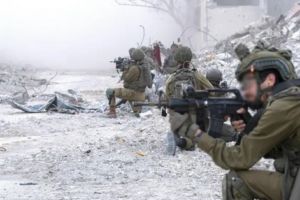Refusing to serve comes at a price, but I can’t support Israel’s regime anymore

Israeli troops in action in Gaza, April 2025
Guy Perl writes in Haaretz on 11 April 2025:
It so happened that I was called up to serve in the war on my birthday (my 27th), a few weeks after October 7. In the midst of all the mourning and confusion and fear, the notice from my battalion arrived.
I did my reserve duty as part of the Israel Defense Forces Home Front Command, as a medic in a search and rescue battalion. Given its task – rescuing civilians in the event of an attack, in this case on Haifa – I enlisted despite my misgivings regarding Israel’s intentions. By then it was clear that on the war’s first day, we had already lost. By then it was clear that the government and the military, the media and the public refused to recognize this. By the time I was called up, I knew that, had this been the goal, the hostages would have been home already
Notwithstanding all of the above, it was also clear to me that Israel remains a nation under threat, and that a battalion such as ours must be prepared should the war expand. I reported for duty.
My first tour of reserve duty in this war concluded without any unusual incidents in our sector. The IDF embarked on its ground maneuver in Gaza, the scope of the killing and destruction we caused there became clear and my misgivings vis-a-vis my service, its purpose and its usefulness grew. A year and a half have passed, in which the army has killed dozens of hostages and tens of thousands of Gazans, and the government has made it clear that the war’s real goal is to keep it in power. I continued to report for duty when I was called, due to fears that strikes on the north could extend as far south as Haifa. The one exception to that came in April 2024, when we were notified that we were to be sent to the West Bank. That order I flatly refused, without hesitation.
Then came the most recent call-up for reserve duty, in March. The cease-fire in Gaza was in effect – it began on January 19 – when my company was sent to serve along the Jordanian border. After much deliberation – I knew it was just a matter of time before the government found a way to scuttle the relative quiet – I decided I would report for duty. After all, this is the country’s border, and some sort of military presence ought to be maintained there. Then, on March 18, the IDF renewed the fighting in Gaza.
Hundreds of Gazans were killed on that first night of bombing. Innocent children, entire families – obliterated. This was a declaration of intent by the members of the regime that has taken root here, because nothing is more important to them than to avoid the serious reckoning that will inevitably take place with the end of the fighting.
It was no easy matter, deciding to refuse. It’s not a simple case: As noted above, I believe our battalion’s mission is important. But two things made up my mind for me.
First, there is the matter of complicity. The IDF, as an organization, time and again throughout the last year and a half (not to mention during previous decades), has chosen to give priority to the professional survival of its chiefs, thus preserving its own power, despite causing the death of vast numbers of Palestinians, over the paramount task of protecting the lives of Israeli citizens. With the renewal of its strikes in Gaza last month, it again made clear its commitment to that enterprise. I could no longer continue to serve wholeheartedly in an organization that behaves in this way and espouses such values.
The second, more important reason for my refusal is the regime itself. A government of criminals played on and exacerbated the public’s desire for revenge, so as to escape responsibility and consolidate its own power. These are people who have repeatedly made it clear, by word and deed, that they have no interest in actually running the country, and certainly not in the welfare of its people. They are only interested in ruling it.
They take advantage of every opportunity – legal or illegal – to dismantle our already shaky democracy. They take away rights from Palestinian citizens, imprison them without due process, evict them violently from their homes. They have sicced their own voters on opponents of the regime, they have taken over the police and are in the process of taking over the Shin Bet security service – and they will eventually turn their power against every one of us. Every Israeli citizen, whether Jewish or Palestinian, every Palestinian resident of the West Bank and Gaza – all are targets for this government. Nobody is safe.
Nobody should cooperate with such a regime. Our most powerful means of resistance – perhaps the only one that could have any effect – is refusal, both of military service but also by way of civil disobedience. Refusal to allow them to lead this country any deeper into the abyss. I expected that my dissent would come at a price, and that the position I was taking would also exact a price from my family and friends, as well as for the military. I was prepared to be sent to prison. This time, it ended with a fine – a small price to pay for trying to build a better country here.
Guy Perl, a member of the Soldiers for the Hostages organization, served as a medic in an IDF search and rescue battalion.
This article is reproduced in its entirety
